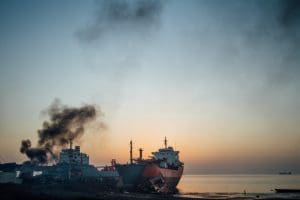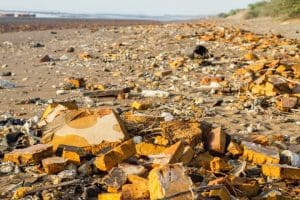
(Photo by Adam Cohn – www. adamcohn. com – Dawn at Alang Shipyards, 2015)
Brussels, 16 November 2015 – The NGO Shipbreaking Platform, a global coalition of 19 environmental, human rights and labour rights organisations working to end polluting and dangerous shipbreaking, denounces Italian shipping companies Grimaldi Group, Ignazio Messina and Vittorio Bogazzi & Figli for their poor shipbreaking practices and calls upon them to take necessary actions to ensure the sustainable recycling of their end-of-life fleet as a matter of urgency. The Platform has sent letters to the Italian ship owners and the Italian Shipowners’ Association, inviting them to initiate a constructive dialogue with the NGO. [1]
Whilst an increasing number of ship owners do not want to be associated with dangerous and polluting practices [2], Grimaldi Group, Ignazio Messina and Vittorio Bogazzi & Figli have continued to sell their vessels to shipbreaking yards that are globally acknowledged not to respect basic human rights and environmental protection standards. [3] According to data collected by the NGO Shipbreaking Platform, the three Italian companies have since 2009 sold fifty-four end-of-life ships to South Asian beaching yards for substandard breaking. [4]

(Photo by Adam Cohn – www.adamcohn.com – Insulation on Beach, Alang Shipyards, 2015)
In the letter sent to the Italian ship owners, the Platform reminds the companies of their obligations under European waste laws as well as the standards for safe and green ship recycling as set in the new European Regulation on Ship Recycling. None of the South Asian beaching yards meets the requirements of the new EU Regulation on Ship Recycling. Based in the European Union, Grimaldi Group, Ignazio Messina and Vittorio Bogazzi & Figli are asked to adopt a ship recycling policy that is in line with EU standards and legislation.
“The NGO Shipbreaking Platform has constructively consulted with many responsible owners of vessels and has together with these companies identified sustainable solutions for clean and safe ship recycling. We would be glad to exchange with Grimaldi Group, Ignazio Messina and Vittorio Bogazzi & Figli about available solutions”, said Ingvild Jenssen.
Naples based Grimaldi Group has reacted to the Platform’s letter and acknowledged the importance of proper ship recycling. Thanking the Platform for having brought this issue to their attention, Grimaldi Group further states that they remain open to initiating a dialogue with the Platform with the aim of finding sustainable solutions for their end-of-life fleet.
NOTES
[1] Letter to Grimaldi Group in Italian; letter to Ignazio Messina in Italian; letter to Vittorio Bogazzi & Figli in Italian.
[2] Numerous large shipping companies already follow sustainable ship recycling policies. In addition to several Norwegian ship owners such as Grieg, Wilhelmsen and Høegh, also German Hapag-Lloyd, Danish Maersk Lines, Royal Dutch Boskalis, Canadian CSL Group and Singapore-based China Navigation Company, have committed to ensuring the proper end-of-life management of their fleet. They do so on principle, even if they have to compromise on their profits – they simply do not want to be responsible for polluting sensitive coastal zones and putting workers lives at risk during dirty and dangerous shipbreaking on tidal beaches. The recent announcement of the Norwegian Shipowners’ Association adds many more shipping companies to the list of responsible stakeholders.
[3] In India, Bangladesh and Pakistan, end-of-life vessels are demolished in the intertidal zone. This practice would never be allowed in the EU and has been banned in other ship recycling countries such as China, Taiwan and Turkey. The beaching of vessels does not allow for the containment and safe removal of hazardous waste from the structure of the vessel and cannot prevent the pollution of the coastal environment. Moreover, beaching cannot guarantee the protection of workers’ health and safety. In particular the shipbreakers of Bangladesh employ children and young boys, which is illegal under international law as well as the Bangladesh Labor Act. The International Labour Organisation (ILO) considers shipbreaking as one of the most hazardous jobs in the world. None of the South Asian yards meet the requirements of the new EU Regulation on Ship Recycling.
[4] Grimaldi Group: 10 ships; Ignazio Messina: 14 ships; Vittorio Bogazzi & Figli: 30 ships.





